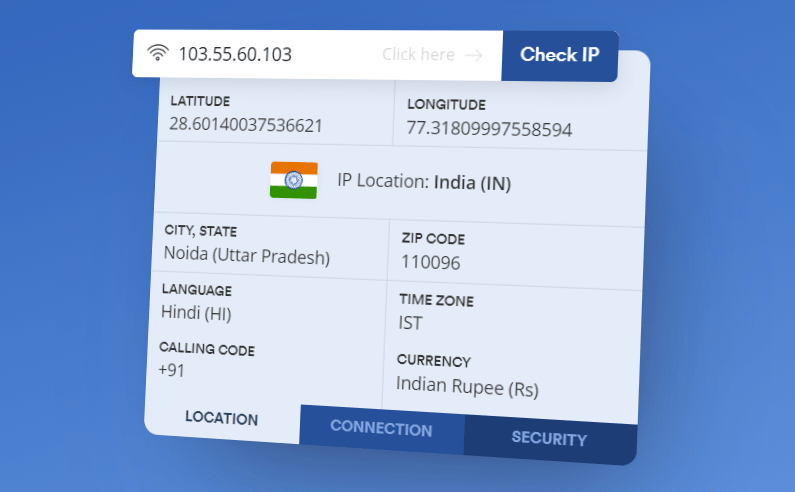Website visitors details plays an important role for any website to connect with their users to provide best user experience and services. Website owners always looking for its users details, but its not very easy to get complete details of website visitors as they belong from around the world.
So if you’re a website owner or developing a website and wants to get details of your website visitor details, then you’re here at the right place. In this tutorial you will learn how consume Ipapi with PHP to get ip address information.

Also, read:
With ipapi integration in your application, you can easily get your website visitors details using IP Address.
So let’s proceed to consume ipapi with PHP to get IP address details with example.
Step1: Create API Access Key
We first need to sign up to ipapi to create an account to get API Access Key.
We will use created API Access key to make HTTP request to get IP Address details.
https://api.ipapi.com/api/161.185.160.93
? access_key = YOUR_ACCESS_KEY
Step2: Make HTTP API Request to Ipapi API
We will implement functionality to make HTTP request to ipapi to get IP Address details with PHP CURL library. We will use API Access Key and ip address to get IP address details. You can also pass multiple IP address as comma separated to get details.
<?php
$ip_ddress = '161.185.160.93';
$api_access_key = 'YOUR_ACCESS_KEY';
$ch = curl_init('https://api.ipapi.com/'.$ip_ddress.'?access_key='.$api_access_key.'');
curl_setopt($ch, CURLOPT_RETURNTRANSFER, true
$response = curl_exec($ch);
curl_close($ch);
?>
Step3: Display IP Address Information
We will use result response JSON data to display IP Address details. We will decode the response JSON data and display results.
<?php $result = json_decode($response, true); echo $result['time_zone']['code']; ?>
Step4: Complete Code To Consume Ipapi API with PHP
Below is the complete code to consume ipapi to make HTTP request to Ipapi to get IP address details.
<?php
$ip_ddress = '161.185.160.93';
$api_access_key = 'YOUR_ACCESS_KEY';
$ch = curl_init('https://api.ipapi.com/'.$ip_ddress.'?access_key='.$api_access_key.'');
curl_setopt($ch, CURLOPT_RETURNTRANSFER, true
$response = curl_exec($ch);
curl_close($ch);
$result = json_decode($response, true);
echo $result['location']['languages'];
?>
Below is the response data in JSON format from Ipapi for the IP Address “161.185.160.93”
{
"ip": "161.185.160.93",
"hostname": "161.185.160.93",
"type": "ipv4",
"continent_code": "NA",
"continent_name": "North America",
"country_code": "US",
"country_name": "United States",
"region_code": "NY",
"region_name": "New York",
"city": "Brooklyn",
"zip": "11238",
"latitude": 40.676,
"longitude": -73.9629,
"location": {
"geoname_id": 5110302,
"capital": "Washington D.C.",
"languages": [
{
"code": "en",
"name": "English",
"native": "English"
}
],
"country_flag": "http://assets.ipapi.com/flags/us.svg",
"country_flag_emoji": "🇺🇸",
"country_flag_emoji_unicode": "U+1F1FA U+1F1F8",
"calling_code": "1",
"is_eu": false
},
"time_zone": {
"id": "America/New_York",
"current_time": "2018-09-24T05:07:10-04:00",
"gmt_offset": -14400,
"code": "EDT",
"is_daylight_saving": true
},
"currency": {
"code": "USD",
"name": "US Dollar",
"plural": "US dollars",
"symbol": "$",
"symbol_native": "$"
},
"connection": {
"asn": 22252,
"isp": "The City of New York"
},
"security": {
"is_proxy": false,
"proxy_type": null,
"is_crawler": false,
"crawler_name": null,
"crawler_type": null,
"is_tor": false,
"threat_level": "low",
"threat_types": null
}
}
Step5: Conclusion
In this tutorial you have learned how consume Ipapi using PHP. You can also checkout documentation for more options and features to integrate API. You can also integrate API with other programming languages as well.
You may also like:
- IP Geolocation API – IPWHOIS.IO
- How to Integrate IP Geolocation API with PHP
- Scrape Search Result Data using SerpApi with Python
- Get Geocoding using Positionstack API with PHP
- Flight Data using Aviationstack API with PHP
- Get Address Information using Geocode API with PHP
- Review Scraping using ReviewAPI with PHP
- Simple Web Scraping with Zenscrape API using PHP
- Scrape Search Result with Zenserp API using PHP
- Build User Agent Lookup System using Userstack API with PHP
- Build IP Lookup Website using ipapi with PHP
- Build Weather Website with Weatherstack API using PHP
- Get Website Visitors Info using IPStack API with PHP
- Scrape SERP Data using SerpStack API with Python